An air of uncertainty in town where Latino roots run deep
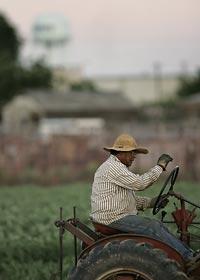
WAPATO, Yakima County — Liliana came to the United States illegally three years ago, hiking five days across the desert while pregnant. She works in the Wapato area, cutting asparagus spears this week before moving on to cherries, pears and apples in a season that stretches into November.
During the slow winter months, Liliana would like to head south to rejoin family and friends in her home state of Michoacán. But the costs and perils of a return trip across a tightening border have dissuaded her.
So instead, Liliana, who declined to give her last name for fear of deportation, has become a year-round resident of the Yakima Valley. She shares a small house outside of town with her husband, Ramiro, her young daughter, Leslie, and another family of four.
Liliana's transformation from migrant worker to resident is part of a broader shift in the Central Washington farmworker community.
Increasing numbers are settling here in the Yakima Valley — rather than working the seasonal crops and moving on. Latinos now make up about 40 percent of the population in Yakima County — more than double the percentage two decades ago.
In Wapato, Latinos now account for more than 70 percent of the 4,500 residents. The downtown boasts Mexican bakeries, grocery stores and butcher shops. The mayor is Latino as are some members of the City Council.
The Latino presence in the valley — and their contributions to the farm economy — will be acknowledged Wednesday as Mexican President Vicente Fox visits a nearby Hispanic-owned orchard in the first stop of an overnight visit to Washington state.
His visit also will underscore the fault line that runs through Wapato and the rest of the valley, dividing those who have the right to reside in the United States and those who always face the possibility of deportation.
Fox's appearance comes as an unsettling mix of hope and fear pervades the valley's Latino farm-labor community, many members of which are thought to be living here illegally.
The hopes were expressed earlier this month, as a march on behalf of immigration changes that would legalize workers drew an estimated 5,000 to 8,000 people — one of the largest political gatherings in county history — to the streets of Yakima.
"I know that it was a very difficult thing for people to go, and I was very impressed by the young people taking to the streets," said Wapato Mayor Jesse Farias. "It shows we have a lot of leadership potential, and down the road they will be in place to make things happen."
The fears result from huge uncertainties over how the immigration changes will play out. The Bush administration is pushing for a guest-worker program and a path that would eventually allow many illegal immigrants to gain legal residency. At the same time, Bush is sending National Guard troops to help seal the Mexican border, and the Department of Homeland Security has announced plans to step up workplace enforcement raids.
Growers also are on edge.
The valley's high-value crops require vast amounts of labor — more than 26,000 jobs in 2005 — to prune, thin, harvest, sort and pack.
Last year, growers say, labor shortages delayed harvesting the apple crop, forcing some fruit to be picked in an overripe condition. This year, they wonder whether there will be enough workers at harvest time, and whether they will see federal immigration officers in the orchards.
"There is a tremendous amount of unease and unknown," said Mike Gempler, executive director of the Washington Grower's League, which has been lobbying Congress for changes in immigration policy. "The system has been broken for a long time."
Where roots run deep
The sign at the edge of downtown says "Welcome to Wapato, Harvest A Plenty."
There is no doubt that this town owes its existence to the nearby farms and orchards. The biggest buildings are the cavernous packing plants, where apples, pears and other fruits are stored and shipped out to market. Neighborhoods are filled with small wood-frame houses that sell for less than $100,000 and allow farmworker couples, who may make $20,000 or more a year, to take an ownership stake in the town.
On an unseasonably hot spring evening, women were chatting on porches and children were playing under a park sprinkler. A group of men, after a day in the orchards, sipped beer under the shade of a pear tree while others worked on cars.
Latino roots run deep here, and there are plenty of success stories that began in the fields.
Mayor Farias' father arrived in the Yakima Valley in the 1940s to work in the fields, and Farias spent a lot of his youth helping bring in crops. But he went on to work in state government for 30 years, most of the time at the Department of Employment Security.
Gilbert Gonzales Sr. arrived in 1952 to work in hops, which must be twined up on trellises. He now runs a 40-acre vegetable farm outside of town with his son, Gilbert Gonazales Jr. They grow 18 varieties of peppers, including an ample selection of jalapeños to cater to the Latino market as well as U-picks for expanding clientele from Western Washington.
Meanwhile, the next generation of the Gonzales family is headed off the farm to careers in nursing and computers. "Their hearts are not in farm work," says Gonzales Jr. "It's just too hard."
Within this community, there also is plenty of pride and patriotism that transcends the border.
Mexican-born Jose and Gloria Reynoso arrived in Wapato in 1982 and raised a family of five from the earnings in the fields and packing houses. One of their sons, Sgt. Yadir Reynoso, joined the Marines and died in the summer of 2004 during a battle in Iraq.
Much of the community mourned his passing as his flag-draped coffin was set out for viewing in the Wapato High School gym. He received a Silver Star for his actions, and the City Council approved Aug. 15 as a day to honor his memory.
Still, other families struggle with questions of tangled immigration status.
Christina Lopez, for example, is a U.S. citizen born in the valley 24 years ago. Her parents arrived here illegally but eventually benefited from an amnesty program put in place in the 1980s under President Reagan. She dropped out of school in eighth grade to work full time in the fields and was cutting asparagus last week alongside her boyfriend, Everado, an illegal immigrant who arrived here two years ago.
Lopez and Everado met each other while picking apples and now share a Toppenish apartment and the challenges of raising Lopez's two young daughters. But Lopez frets over the future, should Everado be sent back to Mexico.
"I think Mexicans are not criminals," she said. "They just want to work."
Services available
While the presence of illegal immigrants is a subject of bitter national debate, in Wapato the question rarely takes center stage.
Farias, the mayor, said he doesn't know how many town residents are in the country illegally.
That information, he said, is "absolutely none of my business. I tell the people, we provide services for them — city, water and sewer — regardless of where they came from. Everybody should be treated the same, and the police chief has the same instructions."
The three banks in town have bilingual staffs and help finance home purchases for residents, including some who may have come to the United States illegally, according to Farias.
Wapato also has state and federally funded services that support newly arrived farmworkers, regardless of their legal status.
Each morning, before heading off to work, Liliana drops off her daughter at a Head Start Center operated by the Washington State Migrant Council. The council also provides home visits to educate migrant families about local resources.
All low-income farmworkers are eligible for food stamps, according to Bill Nicacio, a family-service worker for the council. But many — such as Liliana — have balked at obtaining the benefit, fearing it might later complicate efforts to gain the right to work legally in the United States.
Nicacio said the immigration debate has spawned lots of rumors among migrants, making some leery of moving to other states or back to Mexico.
Instead, Liliana tried to get her family through last winter in the Yakima Valley on spare savings. Sometimes, they were eating only beans, so she was grateful for the start of the new spring labor season.
Looking toward the future, many farmworkers with children born in the United States long for a way to establish permanent legal residence. But Liliana, with memories of home still fresh, says U.S. citizenship is not important.
"I just want to go home," she said. "To work here, go home and be able to come back."
Hal Bernton: 206-464-2581 or hbernton@seattletimes.com
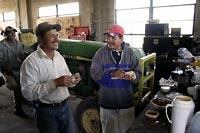
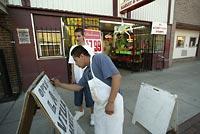
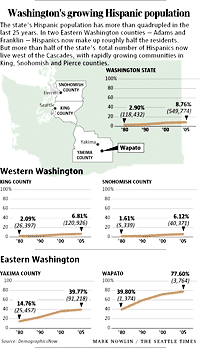
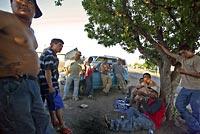

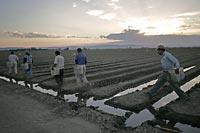
President Fox's packed schedule includes meetings with farmworkers, top executives.